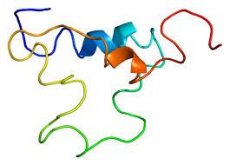Scientists have discovered the property of an insulin-like molecule that will help control appetite
Last reviewed: 23.04.2024

All iLive content is medically reviewed or fact checked to ensure as much factual accuracy as possible.
We have strict sourcing guidelines and only link to reputable media sites, academic research institutions and, whenever possible, medically peer reviewed studies. Note that the numbers in parentheses ([1], [2], etc.) are clickable links to these studies.
If you feel that any of our content is inaccurate, out-of-date, or otherwise questionable, please select it and press Ctrl + Enter.

The microflora of the large intestine contains a large number of molecules. One of them - an insulin-like peptide 5, whose purpose for scientists remained a mystery until recently. Studies have shown that this molecule can be useful in the treatment of poor appetite or obesity.
As we found out to employees of one of the US universities, insulin-like peptide 5 participates in the transmission of signals about saturation or hunger to the brain.
The latest research project showed that there is a constant interaction between the brain and the intestine. Now scientists know two hormones that affect appetite. The first hormone is called ghrelin, which works at the brain level, and the insulin-like peptide 5 acts directly in the intestine.
The research team conducted an experiment on rodents, during which insulin-like peptide 5 was injected into healthy individuals, which stimulated appetite in mice. The action of the molecule began approximately 15 minutes after the administration and lasted for three days. At the same time, scientists noted that genetically modified laboratory rodents who did not have insulin-like peptide receptors 5 did not stimulate appetite when the molecule was introduced.
A group of scientists was able to create an artificial insulin-like peptide 5, i.e. They were able to approach the development of a drug that could affect the appetite. Scientists suggest that they will be able to create a tool that will help suppress the feeling of hunger and patients with type 2 diabetes or obesity. Also, a similar effect can be used to develop a drug to treat patients who need a good appetite, for example, after chemotherapy or HIV-infected. A distinctive feature of new drugs that will be created on the basis of insulin-like peptide 5 is that there is no need to overcome the blood-brain barrier, which will solve the delivery problems.
The problem of obesity in recent years is becoming more urgent. Recent work of scientists in one of the medical universities showed that not always obesity is a pathology. As specialists have found out, an enzyme called hemoxygenase-1 is of key importance in the development of metabolic disorders. The level of this enzyme in the human body can show how obesity can be dangerous in each individual case. According to statistics, practically in 1/4 of the total people metabolism is not disturbed, i.e. They are not affected by the development of diabetes mellitus or systemic inflammatory processes.
Experts suggest that the concept of "healthy obesity" is still there. Earlier studies have shown that there is a direct relationship between a metabolic disorder and a level of hemoxygenase-1 in the liver and adipose tissue. In addition, the results of studies of twins showed that in metabolic disorders, more enzymes are present in the human body.
Studies on laboratory rodents have shown that without hemoxygenase-1, the level of markers of inflammation decreases. When removing from the gene from the liver, even with too high-calorie nutrition the body functions normally and a decrease to insulin was not observed.
As scientists believe, it is the enzyme hemoxignase-1 that provokes inflammation and metabolic syndrome.

 [
[